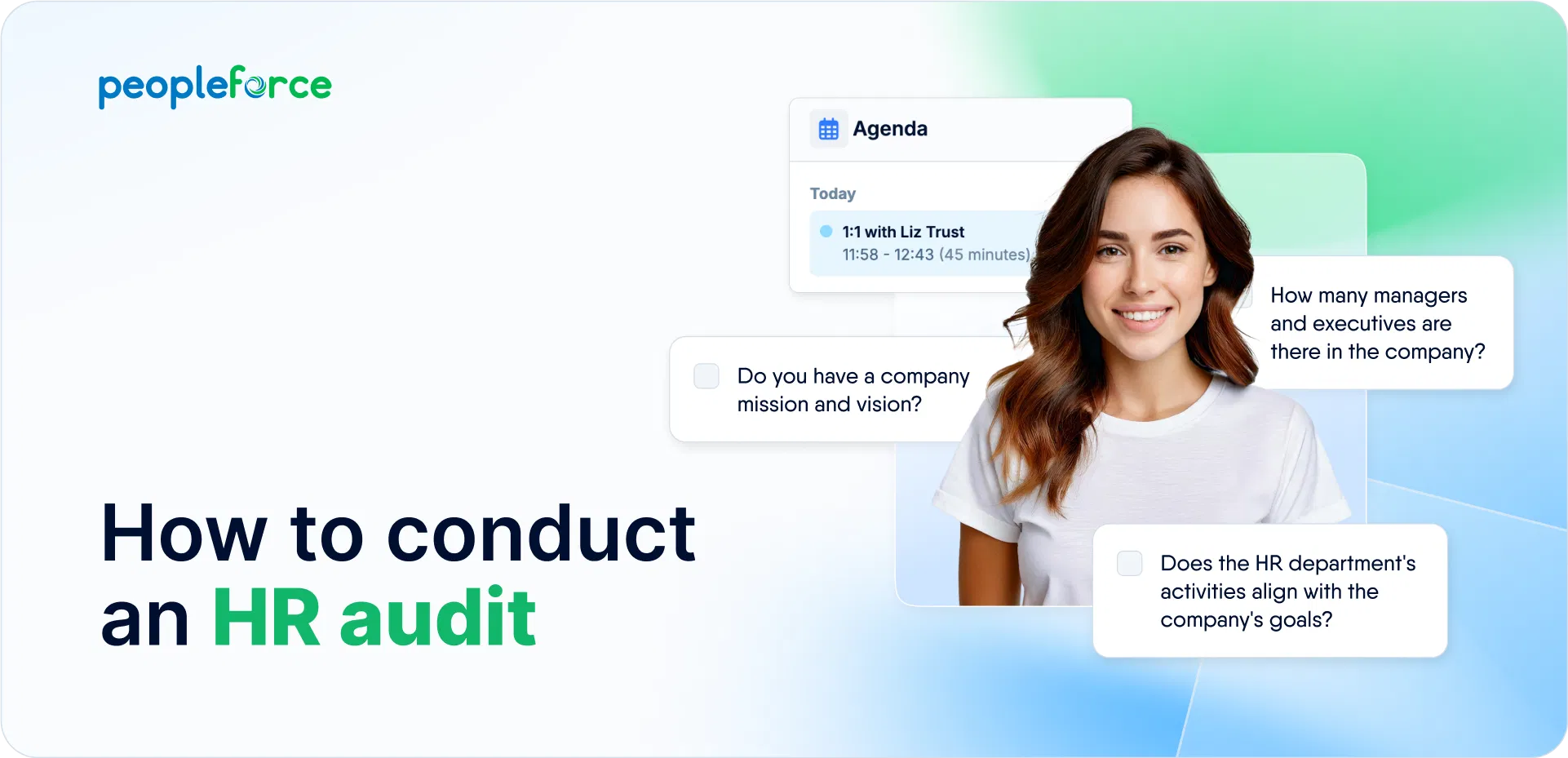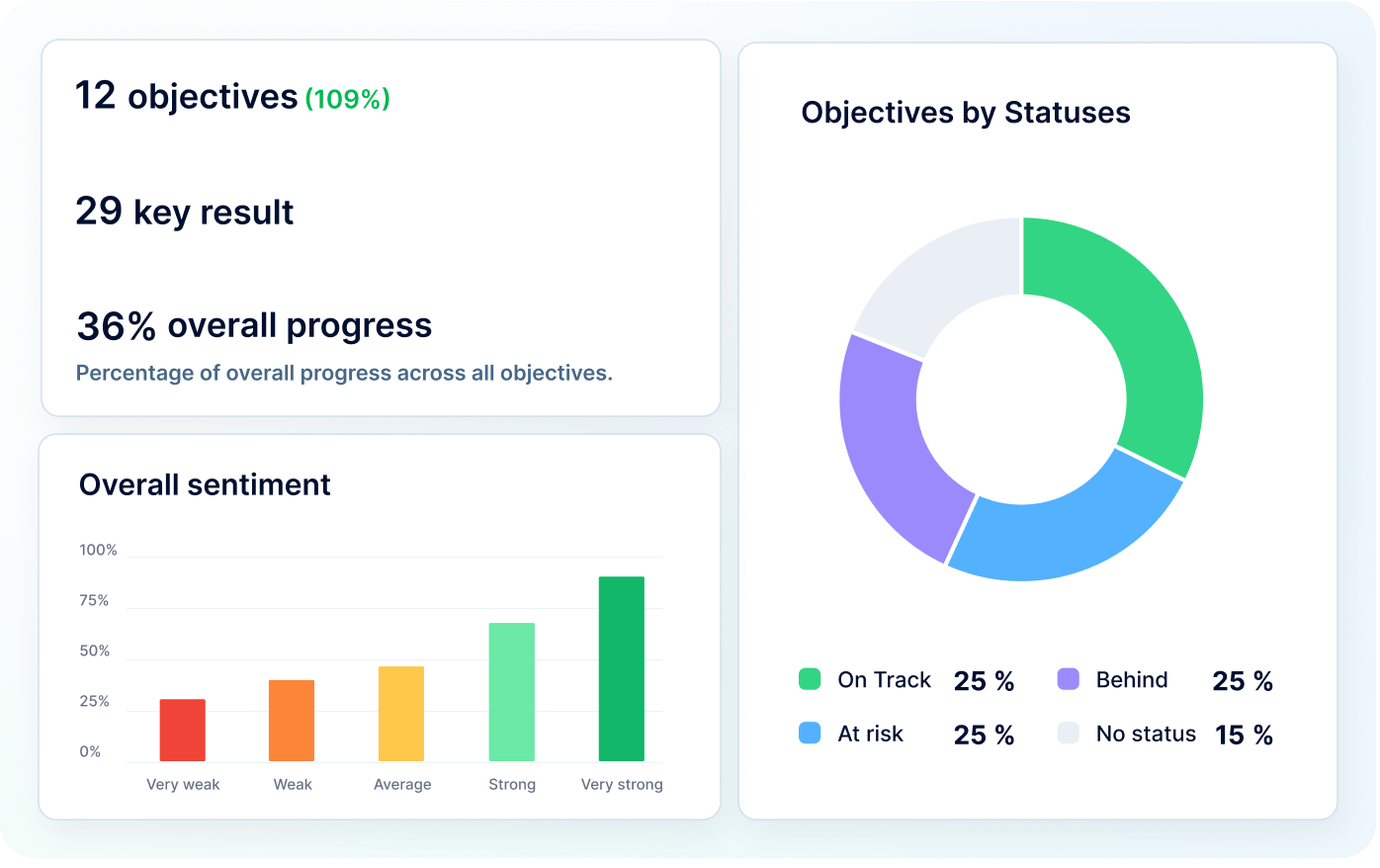
Why and how to conduct an HR audit as an SMB
If you're starting a small business or a startup and want it to grow well, consider doing an HR audit early on. It helps you balance things from the beginning, so you don't have to fix big problems later on in your team. It's like building a strong foundation for a house – it's better to get it right from the start than to have to redo it later.
A proper human resource audit will show the HR department where it needs to invest resources, what HR processes need to be fixed, what has been going really well, and where the gaps in its workforce should be filled.
That’s why we will, in this article, walk you through all the necessary steps of an HR audit for a small and medium-sized business. We’re starting by defining what an HR audit process is.
What’s an HR audit
At PeopleForce, we define an HR audit as an HR compliance audit, "the process of reviewing an organization's HR policies, procedures, practices, and documentation to assess legal compliance, including adherence to federal employment laws”.
The audit can be conducted internally by the organization's HR person or by an independent auditor.
During an HR audit, it's essential to review core HR processes. While this list is not exhaustive, it covers key areas, including:
- Recruitment: Evaluating the effectiveness of hiring processes and compliance with regulations.
- Performance management: Reviewing how employee performance is assessed and managed.
- Compensation and benefits: Analyzing salary structures, benefits packages, and compliance with the Fair Labor Standards Act.
- Employee relations: Assessing the overall relationship between employees and the company, including communication, conflict resolution, and satisfaction.
- Labor law compliance: Ensuring adherence to employment laws, such as minimum wage, overtime, and anti-discrimination regulations.
- Employee records: Verifying the accuracy and security of employee documentation, contracts, and other information.
- Learning and development: Evaluating training programs and opportunities for employee skill growth.
- Data management: Reviewing HR data management processes to ensure confidentiality, integrity, and compliance with data protection regulations.
An HR audit process aims to determine how effectively your HR department manages people properly. The best thing about a Human Resources audit is that the data you receive is indispensable – you can double down on the good things and fix the mistakes, errors, and gaps that you find with the audit.
As soon as you get the data from the audit, you can immediately create an action plan to improve your human resource management. The best thing about the audit is that it has a natural tracking mechanism; you do one every year, so you can check how effective your actions were by comparing the problems the current audit discovered with those the previous audit found out.
Who needs an HR audit?
The short answer? All companies.
A human resources audit is a process that all companies should have in their organizations, no matter their size, industry, or longevity in the market.
It’s not just legal compliance that companies need to be aware of; there are also internal documents and policies that the company should create and follow to know how to deal with specific situations, such as:
- Health and safety hazards
- Disciplinary process
- Code of conduct
- Dress code
- Harassment policy
- Termination process
- Employee documentation, including compensation rules, leave policy, performance and improvement plans, rewards and recognition, etc.
Establishing HR processes is crucial. This ensures readiness for any situation rather than facing gaps when they're needed.
Why HR management should do an HR audit annually
Some SMBs, depending on their size, don’t even have a human resources department, but that doesn’t mean that they shouldn’t conduct an HR audit.
No business owner wants to pay expensive fees and penalties because they haven’t complied with employment laws. That’s why it’s necessary to do HR audits every year; laws and regulations change, and you need to stay up-to-date to ensure compliance.
On top of the legal compliance, an HR audit helps you understand your company better.
You can have the executives perform one through the usage of HR platforms such as PeopleForce, but no matter what, you should do an audit. You need to ensure that you at least comply with the local laws and regulations.
With an HR audit, you can see if you need to:
- Recruit more people so that you have enough talent to take on new projects and successfully finish the current ones.
- Revise your pre-boarding and onboarding process so that your new employees can get up to speed as quickly as possible without stress.
- Reduce absenteeism in the company so that you don’t create any unexpected and unplanned absences that could stifle growth.
- Run pulse surveys to improve employee engagement and quickly address emerging problems. You can also use the HR platform to create highly customizable pulse surveys.
- Revamp your OKRs framework to ensure that every employee is aligned with the company's overall objective across departments and the entire company.
How to do an HR audit for small and medium-sized businesses
Any HR platform can facilitate an HR audit. When you’re looking to audit the HR function within the company, you can use HR platforms such as PeopleForce, which have an automatic options for HR audits.
Even if you’re a larger team with plenty of data to review, you can still use the platform to receive essential insights.
When preparing, there are a couple of main areas that you should include in every single HR audit, such as performance, recruitment, compliance, and employee engagement.
Recruitment
- Recruitment process from A to Z. What does the recruitment, hiring, preboarding and onboarding process look like, and where can the company improve for better results?
- Effectiveness of hiring channels and recruitment managers. Thanks to automated statistics, you gain insights to understand which channel deserves increased attention as it provides you with good candidates. Managers' performance also plays a role here, highlighting areas for improvement to aid them in the hiring process.
- Employer brand. Yes, an HR audit indirectly helps identify areas for improvement before the initial candidate contact, ensuring they're enthusiastic about the idea of working with you. All of this can be uncovered and influenced during the audit process so that your employees are fully engaged from day one.
Performance
When auditing performance, you can separate it into three entities:
- Organizational processes. What are the clear responsibilities of each company role, and what does the reporting structure look like?
- Performance management. How does the company measure individual employee performance, and what is being done to improve each employee's effectiveness? Our performance management software can help you review your employees' goals.
- Workflows to boost team performance. Assessing the efficiency and effectiveness of key business processes, including those long overdue for automation, is crucial for enabling your employees to grow post-assessment. For instance, automating repetitive tasks, such as scheduling recurring 1:1 meetings to discuss development plans, can free up time for more strategic activities and foster employee development.
Compliance
When you're checking if everything's in line with the rules, there are two main things to look at:
- Laws
First, the rules that apply to the company must be figured out, especially now that more people are working remotely from different places. These rules cover stuff like how employees are treated, keeping data safe, paying taxes, and any other rules specific to the industry. Following these laws is super important to ensure the company is doing things right, treating employees fairly, and avoiding legal trouble.
- Internal and external rules
Then, look at the company's rules and any outside rules that affect how it works. Internal rules cover employee behavior, employee handbooks, data management practices, and security protocols. External rules include industry standards, any certifications needed, and rules set by governments or industry groups. It's important to update and adhere to these rules to keep everything running smoothly, maintain good business practices, and keep the company's reputation solid.
Employee engagement
When analyzing employee engagement, it's helpful to break it down into two key areas:
- Compensation and benefits
This encompasses a range of initiatives, from wellness programs to bonus structures. It's about how a company motivates and uplifts its employees through various benefits packages. By providing attractive compensation packages and benefits, companies can boost morale, enhance job satisfaction, and ultimately retain top talent.
- Learning and development
In today's fast-paced marketplace, employee skills can quickly become outdated. With the half-life of skills estimated at just five years, it's crucial for companies to prioritize learning and development initiatives. These programs ensure that employees have the necessary skills to excel in their roles and adapt to evolving industry demands. By investing in continuous learning opportunities, small businesses empower their workforce and position themselves for long-term success in a competitive landscape.
Try our HR audit eBook
With HR audits, you don’t need to reinvent the wheel. To make your life easier, you should always have an HR audit checklist in place to ensure you don’t forget anything.
We’ve already created a checklist to help you easily conduct an HR audit. We compiled all audit points into a single eBook. The document includes audit points and questions about the following areas of a human resource management audit:
- At the company level
- At the recruiting level
- At the onboarding level
- At the employee bonus program level
- At the communication and employee relations level
- At the performance evaluation and performance management level
HR audits will make your life easier
Schedule HR audits to ensure your company's HR practices are current. Consider leveraging our comprehensive all-in-one HR platform to kickstart your audit this year. Our platform allows your HR manager to conduct audits more efficiently, saving valuable time and resources.
With features tailored to streamline HR processes, our platform empowers your HR team to focus on strategic initiatives and employee development while ensuring compliance and operational excellence.
Book a demo and talk with one of our people who will help you meet your needs.
With over five years in HR tech content creation, Maria explores how technology, people, and culture shape the workplace of today. Her interests include HR, AI, IT, and personal development, and she brings a data-driven, human-centered perspective to her writing.
Get started with PeopleForce today
Automate your HR routine to create a high performance culture in your company. PeopleForce is your best HRM alternative to stay business driven but people focused.

Recent articles
What makes up a company's HR brand, and why is it needed?
Let's break down what makes up the "HR brand", so that hiring staff becomes easy and effective, and senior-level positions are filled within 2-3 weeks.
How much time HR platform saves for HRs and admins
Discover how modern, all-in-one HR software simplifies complex processes, ensures compliance, and boosts efficiency to help HR teams manage growing responsibilities with ease.
Empowering HR management for business through modern HR software
Employee retention is one of the top five priorities for human resource managers. Struggling to keep your talent, let alone empower employees to perform their best? If so, hi, you’re in the right place.

